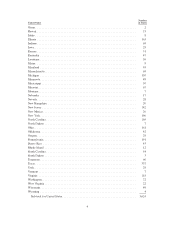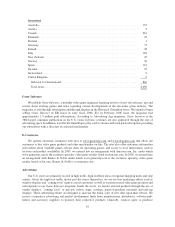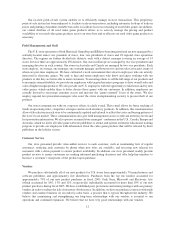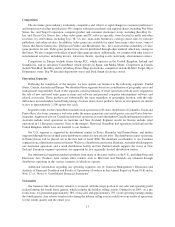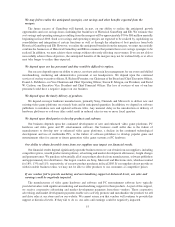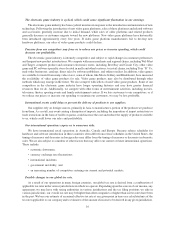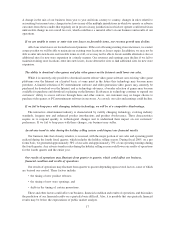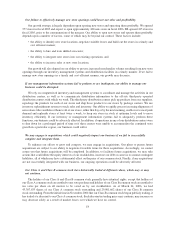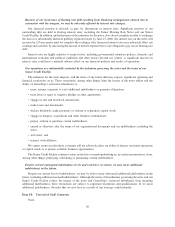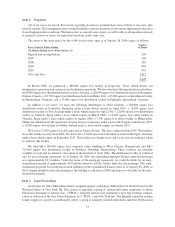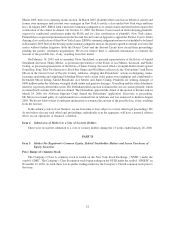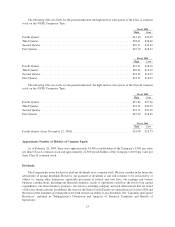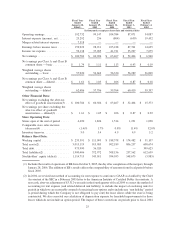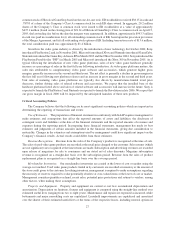GameStop 2005 Annual Report Download - page 28
Download and view the complete annual report
Please find page 28 of the 2005 GameStop annual report below. You can navigate through the pages in the report by either clicking on the pages listed below, or by using the keyword search tool below to find specific information within the annual report.Risks Relating to Our Indebtedness
To service our indebtedness, we will require a significant amount of cash, the availability of which
depends on many factors beyond our control.
Our ability to make scheduled payments or to refinance our debt obligations depends on our financial and
operating performance, which is subject to prevailing economic and competitive conditions and to certain financial,
business and other factors beyond our control. These factors include:
• our reliance on suppliers and vendors for sufficient quantities of their products and new product releases and
our ability to obtain favorable terms from these suppliers and vendors;
• economic conditions affecting the electronic game industry as a whole;
• the highly competitive environment in the electronic game industry and the resulting pressure from our
competitors potentially forcing us to reduce our prices or increase spending;
• our ability to open and operate new stores;
• our ability to attract and retain qualified personnel; and
• our dependence upon software publishers to develop popular game and entertainment titles for video game
systems and PCs.
If our financial condition or operating results deteriorate, our relations with our creditors, including holders of
our Senior Floating Rate Notes and our Senior Notes, or collectively the notes, the lenders under our Senior Credit
Facility and our suppliers, may be materially and adversely impacted.
As a result of the mergers, we have substantial debt that could adversely impact cash availability for
growth and operations and may increase our vulnerability to general adverse economic and industry
conditions.
We incurred significant additional debt as a result of the mergers. As of January 28, 2006, we had
approximately $976.0 million of indebtedness. Our debt service obligations with respect to this increased
indebtedness could have an adverse impact on our earnings and cash flows for as long as the indebtedness is
outstanding.
Our increased indebtedness could have important consequences to you, including the following:
• our ability to obtain additional financing for working capital, capital expenditures, acquisitions or general
corporate purposes may be impaired;
• we must use a substantial portion of our cash flow from operations to make debt service payments on the
notes and our Senior Credit Facility, which will reduce the funds available to us for other purposes such as
potential acquisitions and capital expenditures;
• we may have a higher level of indebtedness than some of our competitors, which may put us at a competitive
disadvantage and reduce our flexibility in planning for, or responding to, changing conditions in our
industry, including increased competition; and
• we are more vulnerable to general economic downturns and adverse developments in our business.
If our cash flows and capital resources are insufficient to fund our debt service obligations, we may be forced to
reduce or delay capital expenditures, sell assets, seek additional capital or restructure or refinance our indebtedness,
including the notes. These alternative measures may not be successful and may not permit us to meet our scheduled
debt service obligations. In the absence of such operating results and resources, we could face substantial liquidity
problems and might be required to dispose of material assets or operations to meet our debt service and other
obligations. Our Senior Credit Facility and the indenture governing the notes restrict our ability to dispose of assets
and use the proceeds from such dispositions. We may not be able to consummate those dispositions, dispose of our
assets at prices that we believe are fair or use the proceeds from asset sales to make payments on the notes and these
proceeds may not be adequate to meet any debt service obligations then due.
19


